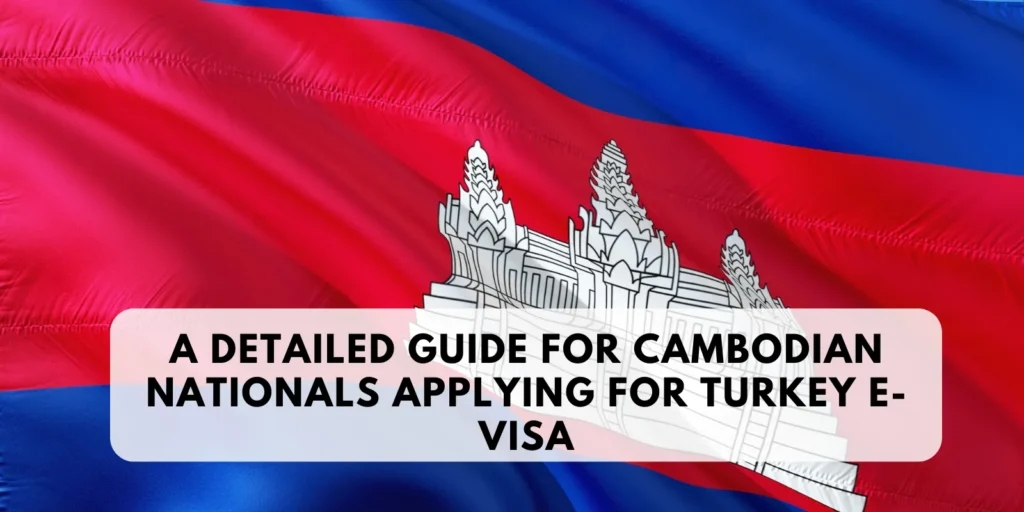Guid Cambodia Visa for Turkish Nationals

Cambodia, with its rich history, vibrant culture, and stunning landscapes, has become an increasingly popular destination for travelers worldwide. CAMBODIA VISA FOR TURKISH CITIZENS Turkish citizens, eager to explore the ancient temples of Angkor Wat, the bustling streets of Phnom Penh, or the serene beaches of Sihanoukville, will need to navigate the visa requirements to enjoy their visit. This article provides a detailed overview of the visa options available for Turkish citizens, the application process, and essential travel tips to ensure a smooth and enjoyable trip to Cambodia.
Understanding Visa Options for Turkish Citizens
Turkish travelers have several visa options when planning a trip to Cambodia, each catering to different types of visits. The most common are the Tourist Visa and the Business Visa, each serving distinct purposes and offering different durations of stay.
Tourist Visa (T-class):
The Tourist Visa is designed for those visiting Cambodia for leisure purposes. Turkish citizens applying for this visa can stay in Cambodia for up to 30 days. This visa is ideal for tourists interested in exploring Cambodia’s cultural landmarks, such as the Angkor Wat temple complex, or experiencing the vibrant city life of Phnom Penh. The Tourist Visa can be extended once for an additional 30 days, allowing a maximum stay of 60 days. Extensions must be arranged before the initial visa expires and can be done through local immigration offices or licensed travel agencies within Cambodia.
Business Visa (E-class):
For Turkish citizens visiting Cambodia for work-related purposes, the Business Visa is the appropriate choice. This visa also permits an initial stay of 30 days but can be extended indefinitely. The Business Visa is suitable for Turkish entrepreneurs, professionals, or anyone involved in business activities in Cambodia. Extensions can be granted for 1, 3, 6, or 12 months, with options for multiple entries, making it flexible for those who need to travel frequently for work. Proof of employment or business activities in Cambodia is required for extensions.
Applying for a Cambodia E-Visa
For a more convenient application process, Turkish citizens can opt for the Cambodia e-visa. The e-visa is an electronic visa that simplifies the application process and eliminates the need for a physical visa sticker.
E-Visa Application Process:
The e-visa application can be completed online through the official Cambodian government e-visa portal. Turkish travelers need to fill out the application form with their personal details, upload a recent passport-sized photograph, and pay the visa fee using a credit or debit card. The e-visa application process typically takes 3 to 5 business days. Once approved, the e-visa is sent via email, and travelers should print it out to present upon arrival in Cambodia.
Entry Points for E-Visa Holders:
The e-visa is accepted at several key entry points, including Phnom Penh International Airport, Siem Reap International Airport, and specific land border crossings. It’s crucial for Turkish travelers to ensure they enter Cambodia through one of these authorized points, as not all borders accept the e-visa.
Visa on Arrival for Turkish Citizens
Another option for Turkish citizens is to obtain a Visa on Arrival (VoA) when entering Cambodia. This option is useful for those who have not applied for a visa in advance and prefer to handle the process upon arrival.
Visa on Arrival Process:
To obtain a Visa on Arrival, Turkish travelers need to present a valid passport, a passport-sized photo, and the visa fee (around $30 USD) at their point of entry. The application process is straightforward, but travelers should be prepared for potential queues, especially during peak travel seasons. The VoA permits a stay of up to 30 days and can be extended once for an additional 30 days, similar to the Tourist Visa. While obtaining a Visa on Arrival is convenient, it may involve waiting times at the airport or border crossing. To avoid potential delays, Turkish travelers might prefer applying for an e-visa in advance, especially during busy travel periods.
Visa Requirements and Extensions
For Turkish citizens, the requirements for obtaining a Cambodian visa are generally straightforward but need to be met to ensure a smooth application process. Valid Passport: The passport must be valid for at least six months beyond the intended date of entry into Cambodia and should have at least one blank page for the visa stamp. Application Form: A completed visa application form is required, whether applying for an e-visa or a Visa on Arrival. Passport-Sized Photo: A recent passport-sized photograph is necessary for both the e-visa and Visa on Arrival applications. CAMBODIA VISA FOR BRITISH CITIZENS Visa Fee: The visa fee varies depending on the type of visa. For the e-visa, it generally costs around $36 USD, while the Visa on Arrival costs about $30 USD. Extensions:
Turkish travelers wishing to extend their stay in Cambodia must apply for an extension before their initial visa expires. For Tourist Visas, an additional 30-day extension can be obtained, while Business Visas can be extended for various periods, from 1 month to 12 months. It’s important to apply for extensions through Cambodian immigration offices or authorized travel agencies to avoid overstaying fines.
Essential Travel Tips for Turkish Citizens
To make the most of their trip to Cambodia, Turkish citizens should consider the following tips: Health Precautions: Before traveling, Turkish citizens should ensure they have received necessary vaccinations. While there are no mandatory vaccines for entry, it is recommended to be vaccinated against Hepatitis A and B and Typhoid. Malaria prevention may also be advisable if traveling to rural areas. Currency and Payments:
The local currency is the Cambodian Riel (KHR), but US dollars are widely accepted. It’s helpful for Turkish travelers to carry small denominations of US dollars, as larger bills may be harder to exchange in local markets. Cultural Sensitivity:
Cambodia is known for its rich cultural and religious traditions. When visiting temples and sacred sites, Turkish travelers should dress modestly, covering their shoulders and knees, to show respect.






